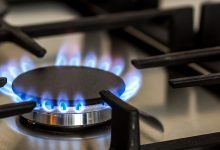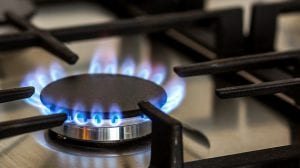Previously I’ve written how blending hydrogen into the fossil gas grid is being used as a “Trojan horse” by Australia’s incumbent and foreign-owned gas distributors in order to sustain their business-as-usual.
Worryingly, in their recently-released Gas Substitution Roadmap, the Victorian government is inviting that Trojan horse into Victoria.
I worry because overseas, detailed analysis warns that forcing hydrogen into the gas grid is another delay tactic, a diversion, distracting us from investing in real climate solutions like electrifying our homes.
Friendly plumbers – no body armour required
Recently in Albury (NSW), I was invited to present on electrifying (getting the gas out of) Victorian homes to an unlikely audience: the Plumbing Sheetmetal Coopersmith Instructors Association (PSCIA), aka the people that train the plumbers. I thank them for the opportunity.
The organisers were wise enough to see that the all-electric home is now a popular thing in Australia. It’s a topic appearing more and more in mainstream news articles. PSCIA members were keen to figure out what plumbing trainees might need to know about this growing trend.
Worryingly, the PSCIA conference organisers warned me I had about as much chance as Ned Kelly of leaving that part of the world in one piece, were I to declare that the practice of piping gas into homes was past its use-by date.
But it turned out I had no need for Ned’s sheet-metal body armour. My talks were well received by the plumbing types.
One fellow came up to tell me that although he may still teach plumbers how to pipe gas, he’d have none of that in the new home he’d just built. “All-electric is the way to go.” Another encouraged me to listen to a UK heat pump podcast.
The gas can go – but the sewerage stays
It’s not as if the all-electric home needs no plumbers. As we see again and again amongst our 65,000 members at My Efficient Electric Home, we desperately need plumbers to become more familiar with hot water heat pumps.
Some plumbing trainees will go on to work with space heating and cooling heat pumps too (i.e. reverse-cycle air conditioning). And the all-electric home will need just as much plumbing expertise to manage rainwater, potable water and sewerage as any other home.
So it’s only the fossil gas that can get in the bin.
At the conclusion of my talks, there was robust Q&A about issues such as the impact of home electrification on the electricity grid, with the AEMO electricity market shutdown front-of-mind.
But there was also recognition of the inflationary impact on eastern Australian gas prices caused by seven years of Queensland Liquefied Natural Gas (LNG) exports, by the continuing step-down of Bass Strait gas output and, more recently, by the Russia-Ukraine conflict.
And there was recognition that heat pumps can provide space and water heating far more cheaply than gas, and that contrary to what can be done with a reverse-cycle air con, you can’t cool your house in summer with a gas heater!
Pushback?
I was expecting more pushback. Finally I did get some from, of all places, a representative of an energy-safety regulatory body who seemed to be in favour of continuing the practice of piping hazardous chemicals into millions of Australian homes.
The case was made by the safety rep that we shouldn’t rush to electrify homes, but rather should offer households “choice”. He seemed to say we should look forward to the day when expensive and maybe even renewable hydrogen would replace fossil methane in the (largely foreign-owned) eastern Australian gas distribution networks.
Burning attraction
Since I am a bit slow, the irony dawned on me only later: A safety regulator seeming to advocate for the use of hazardous chemicals in our Australian homes – fossil gas today and hydrogen tomorrow – where said chemical is then burned and chemically reacted to form a range of other hazardous and harmful compounds that permeate throughout our homes.
Problems such as gas cooktops producing nitrous oxides that contribute to childhood asthma don’t go away if the fuel is switched from methane to hydrogen. Nor does the explosion and fire risk, because for sure like methane, hydrogen also burns and can explode.
In fact, mixing hydrogen with methane and then sending it to your cooktop can enhance the creation of carbon monoxide right there in your kitchen. The new hydrogen safety advice will have to include opening a window when slaving over the spag bol!
Hydrogen in the gas grid: A “suboptimal pathway”
But here’s a problem. Hydrogen in the gas grid is no climate solution. In fact, any time, and money spent by policy makers, technologists, economists, regulators, and others assisting the gas industry to get hydrogen into eastern Australian gas grids is a total waste.
Why do I think this? Or to paraphrase the President of France, why do I know this?
Because in Germany, they’ve actually had a look at the issues around putting hydrogen into European gas grids and they’ve declared it’s all a waste.
In their recent report “The Limitations of Hydrogen in the European Gas Grid”, the Fraunhofer Institute for Energy Economics and Energy System Technology ensures us that hydrogen will play a role, if a limited one, in our future carbon-free economies where it will displace “grey hydrogen in industry and shipping”.
But hydrogen won’t be widely used in gas grids. Fraunhofer warns that “blending green hydrogen into the grid indiscriminately… risks ‘wasting’ hydrogen by having it deployed to sectors like heating where more efficient and cost-effective solutions such as direct electrification using heat pumps are possible”. In this, Fraunhofer is only restating some fairly obvious techno-economics previously published also by Australia’s CSIRO.
Fraunhofer reminds us that there are greater greenhouse gas savings to be had by using green hydrogen where it makes sense (e.g. in industry and for shipping) rather than for indiscriminate use via a widespread gas grid connecting to our homes.
Intergalactic hydrogen (price)
With respect to quantitative costs and economics, Fraunhofer finds that adaptation measures for blending into the gas grid even at small levels of hydrogen (~ 7% based on energy content) will increase fuel prices for households by up to 16% and for industrial users by up to 43%.
In other words, if you run a gas-consuming business, and you want to see your gaseous fuel costs skyrocket even higher, right out of the galaxy, blend in a little hydrogen.
Fraunhofer concludes, “blending [hydrogen into the gas grid], even at low percentages, constitutes a sub-optimal pathway for the deployment of hydrogen and should be avoided…”
The PSCIA people that I met – the people that train our plumbers – they understand we have no need for hydrogen in homes. It’s unfortunate that, so far, our governments and regulatory bodies do not.
Tim Forcey is an independent energy researcher and commentator.









